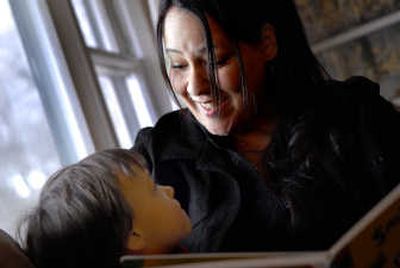Building a life

The first time Shawna Beese-Bjurstrom’s biological mother abandoned her, she was just a few months old.
Her drug-addicted teenage mom forgot her baby a couple of times as she rolled through a hazy life. Soon Beese-Bjurstrom was placed in foster care and by age 3 was adopted by her foster parents.
Babies born to drug-addicted mothers often face health and behavioral problems as they grow up. Beese-Bjurstrom was no exception.
She threw tremendous fits of rage. She skipped school and ran away from home repeatedly. At 17, she had been in and out of the psychiatric unit at Sacred Heart Medical Center. Her adoptive parents were driven to the edge by her lying and running away. That’s when the family showed up at the crisis residential center run by Youth Family and Adult Connections in Spokane.
“I was very, very angry,” said Beese-Bjurstrom, now 34, sitting in one of the small family meeting rooms at YFA Connections. “When they took me here I perceived it as my family trying to get rid of me one more time.”
She remembers that initial time at YFA Connections clearly.
“I skipped school the very first day, and I was surprised when I came back and they asked me about it,” Beese-Bjurstrom said. “I was so used to skipping school and getting away with it – that really surprised me.”
She soon ran away and hitchhiked to San Francisco with a friend. She planned to live a free, hippie life in the Haight-Ashbury neighborhood. No one ever again was going to tell her what to do.
“It was a spectacularly planned run by our standards,” said Teresa Wright, youth and family services director at YFA Connections. “Our kids ran away to Tacoma or maybe Portland – but San Francisco? At the time, we’d never heard of such a thing.”
Today, the memory makes Beese-Bjurstrom smile, but at the same time, she realizes how dangerous her big escape was.
“I mean, we hitchhiked all the way. You don’t want to do that when you are a teenage girl,” she said. “We slept in the Golden Gate Park and there were things going on there that you don’t ever want to see or know about.”
Surrounded by drug use, prostitution and homelessness, she and her friends panhandled for money but couldn’t always agree how to spend it.
Beese-Bjurstrom wanted to do laundry – “I was so dirty,” she said – but her friends weren’t as domestically inclined.
Street life proved much more difficult than she imagined. After about a week she was on her way back to Spokane on a one-way ticket provided by DSHS.
“My parents were here and they were exhausted. And I was thinking, ‘Is there a different way?’ ” Beese-Bjurstrom said. “Still, I couldn’t understand why life wouldn’t go my way. It wasn’t my fault that things weren’t working out.”
Wright was at YFA Connections for the reunion between Beese-Bjurstrom and her parents. She tried to get across to the angry runaway that it doesn’t matter whose fault it is: Your life is your own responsibility.
“When Teresa said that, it kind of washed over me,” Beese-Bjurstrom said.
Unlike some runaways, she had something to return to.
“Her parents absolutely loved her,” Wright said.
And so a chain reaction of second chances began to take shape.
Enrolled in school, Beese-Bjurstrom started attending. She went back to live with her parents – an arrangement that only lasted until she was 18 but provided some stability.
“My adopted parents are great; they are just really awesome,” Beese-Bjurstrom said.
At 19 she graduated from West Valley High School. She returned to YFA Connections for help and counseling. .
Slowly, life began to go her way. Beese-Bjurstrom went on to graduate from nursing school. She married and bought a house, and now she has a 3-year-old son.
The YFA Connections staff counts her as one of its successes, along with thousands of other kids helped since 1969.
“These are bright kids,” Wright said. “They can all have a future if they show up and do the work and take advantage of the programs that are available to them.”
Beese-Bjurstrom said she doesn’t think her story is anything extraordinary.
“I don’t have a big story about being beaten or being sexually abused or anything like that,” she said. “I just ran away, sort of acted up.”
That’s representative of the youth at YFA Connections, Wright said. “They come here because of family conflict.”
Beese-Bjurstrom’s advice for dealing with runaway teens: “Believe in children and let them know you do.”